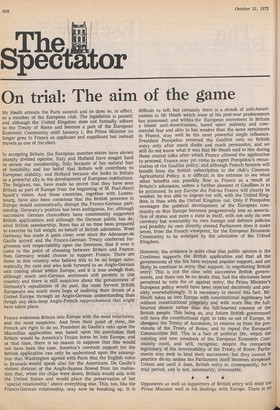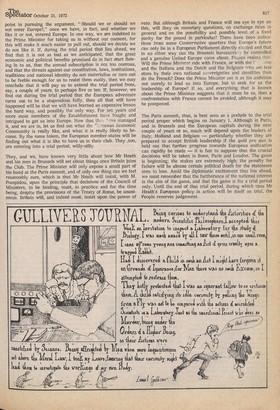On trial: The aim of the game
Mr Heath attends the Paris summit and he does so, in effect, as a member of the European club. The legislation is passed; and although the United Kingdom does not formally adhere to the Treaty of Rome and become a part of the European Economic Community until January 1, the Prime Minister no longer goes to France as applicant and supplitant but instead travels as one of the elect.
In accepting Britain, the European member-states have shown sharply divided opinion. Italy and Holland have sought hard to secure our membership, Italy because of her natural fear of instability and her belief that Britain will contribute to European stability, and Holland because she looks to Britain as a powerful ally in the development of European institutions. The Belgians, too, have made no secret that they have seen Britain as part of Europe from the beginning of M. Paul-Henri Spaak's vision. And these countries, together with Luxembourg, have also been conscious that the British presence in Europe would automatically disrupt the Franco-German partnership. Germany's position has been ambiguous, for, although successive German chancellors have consistently supported British applications and although the German public has desired British membership, Bonn has at no time been prepared to exercise its full weight on behalf of British admission. West Germany has made it quite clear, ever since the Adenauer-de Gaulle accord and the Franco-German Treaty conferred forgiveness and respectability upon the Germans, that if ever it came to the point of choosing between Britain and France, then Germany would choose to support France. There are those in this country who believe this to be no longer automatically the case and who look forward to an Anglo-German axis coming about within Europe; and it is true enough that, although much anti-German sentiment still persists in this country and there is still suspicion about the genuineness of Germany's repudiation of its past, the most fervent British Europeans see much more hope of realising their dream of a United Europe through an Anglo-German understanding than thrugh any skin-deep Anglo-French rapprochement that might have taken place.
France welcomes Britain into Europe with the most reluctance, and the most suspicion. And from their point of view, the French are right to do so. President de Gaulle's veto upon the Macmillan application was based upon his conviction that Britain would be America's Trojan horse let into Europe; and at that time, there is no reason to suppose that this would not have been the case. America's constant support for the British application can only be understood upon the assumption that Washington agreed with Paris that the English veice in Brussels would speak also for the Americans. De Gaulle's violent distrust of the Anglo-Saxons flowed from his realisation that, when the chips were down, Britain would side with the United States and would place the preservation of her 'special relationship' above everything else. This, too, like the Franco-German relationship, may now be breaking up. It is difficult to tell; but certainly there is a streak of anti-Americanism in Mr Health which none of his post-war predecessors has possessed; and within the European movement in Britain a latent anti-Americanism, based upon jealousy and commercial fear and akin to but weaker than the same sentiments in France, may well be the most powerful single influence. President Pompidou reversed the Gaullist vetb on British entry only after much doubt and much persuasion, and we still do not know What it was that Mr Heath said to him during those crucial talks after which France allowed the application to proceed. France may yet come to regret Pompidou's renundiation Of the Gaullist policy; and although French farmers will benefit frdm the British subscription to the club's Common Agricultural Policy, it is difficult in the extreme to see what other benefits clan pOssibly flow to France as a result of Britain's admission, unless a, further element of Gaullism is to be jettisoned. In any Europe des Patries France will clearly be weaker, be less able to impose her will, with the United Kingdom in than with the United Kingdom out. Only if Pompidou envisages the political development of the European colmmunity so that Europe becomes progressively less an association of states and more a state in itself, with not only its own currency but eventually its own foreign and defence policies and possibly its own directly elected Parliament does it make sense, from the French viewpoint, for the European Econdrnic Community to be enlarged by the admission* of the United Kingdom.
However, the evidence is quite clear that public opinion in the Continent supports the British application and that all the governments of the Six have enjoyed popular 'support, and are likely to continue to enjoy that support, in negotiating British entry. This is n'ot the case with successive British governments, and there can be no doubt that, had the electorate been permitted to vote for or against entry, the Prime Minister's European policy would have been rejected decisively and possibly overwhelmingly. It is necessary to record this fact. Mr. Heath takes us into Europe With constitutional legitimacy but without constitutional propriety and with more like the fullhearted dissent rather than the full-hearted content of the British people. This being so, any future British government Will have the constitutional right to take us out of Europe, to abrogate the Treaty of Accession, to remove us from the provisions of the Treaty of Rome, and to repeal the European COmmunities Bill. This is a fact of political life, which the eXisting and new members of the European Econtimic Community must, and Will, recognise, despite the competing legitimacy of the irrevocability of the Treaty of Rome. Parliaments may seek to bind their successors; but they cannot in practice do so, unless the Parliament itself becomes atrophied. Unless and until it does, British entry is, consequently, for a trial period, and is not, necessarily, irrevocable.
Opponents as well as supporters of British entry will wish the Prime Minister well in his dealings with Europe. There is no point in pursuing the argument, "Should we or shbuld we not enter Europe?," once we have, in fact, and whether we like it or not, entered Europe. In one way, we are indebted to the Prime Minister for taking tis in without our consent, for this will Make it Much easier to pull out, should we decide we do not like it. If, during the trial period that lies ahead, we find that it is not as bad as we anticipated, that the great economic and political benefits promised do in fatt start flowing in to us, that the annual subscription is not toe onerous, and that the threats against our constitution, laWs, institutions, traditions and national identity do not materialise or turn out to be feeble enough for us to resist them easily, then we May conclude that it will pay us to extend the trial period from, say, a couple of years, to perhaps five or ten, if, however, we find out during the trial period that the European adventure turns out to be a stupendbus folly, then all that will have happened will be that we will have learned an expensive lesson the hard way, and possibly the only way. For ten years and more most members of the Establishment have fought and intrigued to get us into Europe. Now that they 1-,nve managed it, and we are in, let us find out what the 7...,ronean Economic Community is really like, and what it is really likely to become. By the same token, the European member-states will be finding out what it is like to have us in their club. They ,too, are entering into a trial period, Willy-nilly.
They, and we, have known very little about hbw Mr Heath and his men in Brussels will set about things once Britain joins the Club. The Prime Minister will only expose a small part of his hand at the Paris .summit, and of only one thing can we feel reasonably sure, which is that Mr Heath Will insist, with M. Pompidou, upon the principle that decisions of the Council of Ministers, to be binding, must, in practice and for the dine being, despite the provisions of the Treaty of ROme, be unaniMous. Britain will, and indeed must, insist upon the pciwer of veto. But although Britain and France will see eye to eye on this, will they on Monetary questions, on exchange rates in general and on the possibility and possible level of a fixed parity for the pound in particular? There have been indica:. tions from some. Conservative quarters that Europe's future can only lie in a European Parliament directly elected and that in no other way can the Brussels bureaucra'ci be controlled and a genuine United Europe come about. France resists this. Will the Prime Minister side With France, or with the C. ,aris and the Italians and the Dutch and the Belgians ,"ho set less store by their own national Sovereignties and identities than do the French? Does the Prime Minister see it as his ambition not merely to lead us into Europe, but to seek for us the leadership of Europe? If so, and everything that is known about the Prime Minister suggests that it must be so, then a confrontation with France cannot be avoided, although it may be postponed.
The Paris summit, thus, is best seen as a prelude to the trial period proper which begins on January 1. Although in Paris, and in Brussels and the European capitals during the next couple of years or so, much will depend upon the leaders of Italy, Holland and Belgium — particularly whether they are prepared to accept British leadership if the qued pro quo is held out that further progress towards European unification can rapidly be made — it is fair to suppose that the crucial decisions will be taken in Bonn, Paris and London. The game is beginning; the stakes are extremely high; the penalty for failure will be almOst certain politital death for the 'statesmen seen to lose. Amid 'the diplomatic excitement that lies ahead, we must remember that the furtherance of the national interest is the aim of the game, and that the game is for a trial period only. Until the end of that trial period, during which' time Mr Heath's European policy in action will be itself on trial, the People reserves judgement.











































 Previous page
Previous page